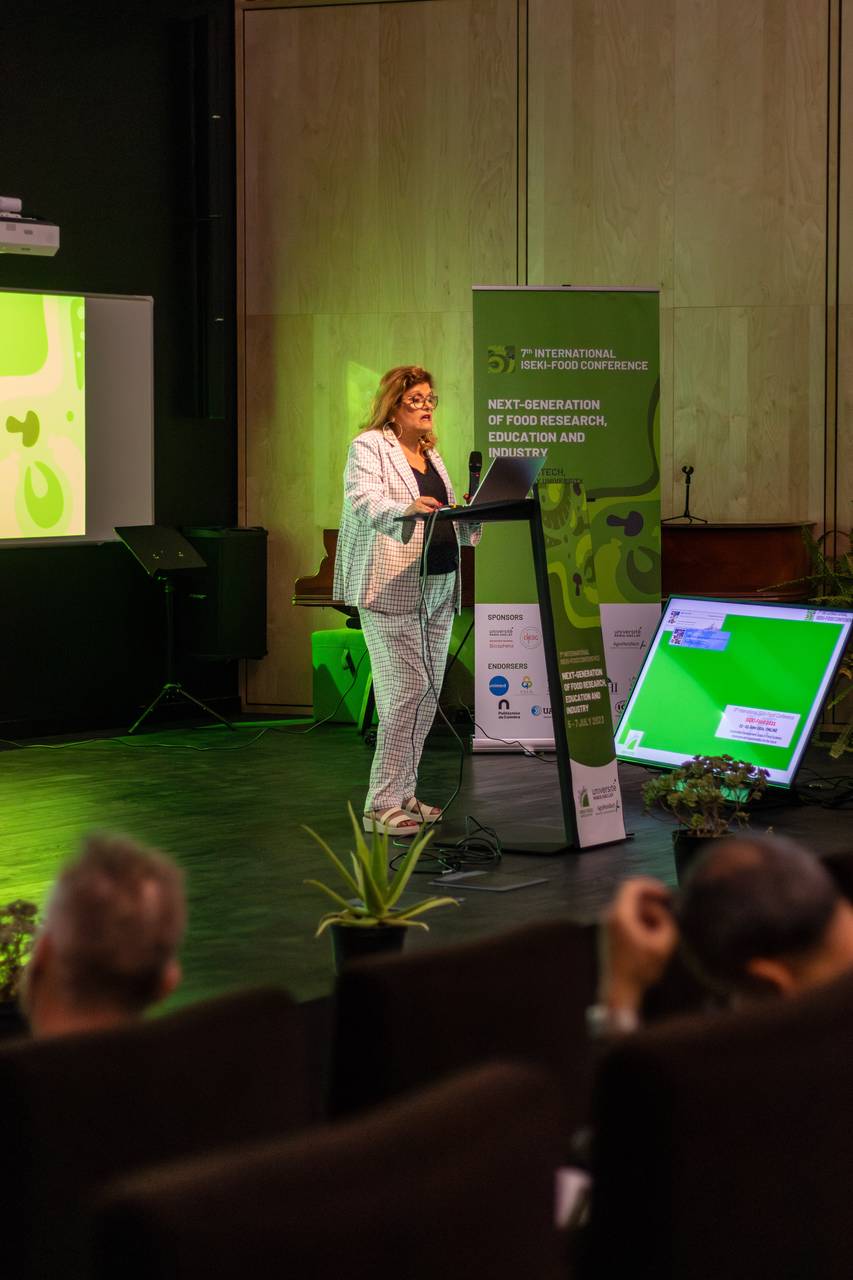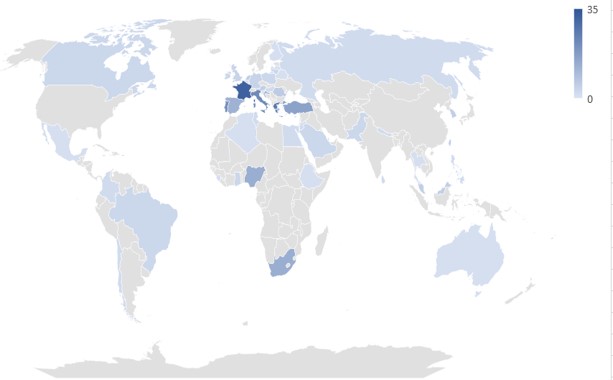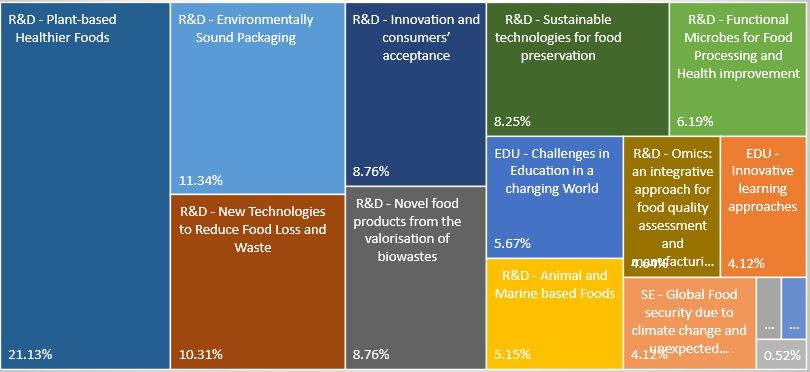International conference on food science and technology under the scientific coordination of MED-UAlg researcher
From 4th to 7th July 2023, the city of Paris hosted more than 200 researchers, engineers and students from around the world at an international conference aimed at debating the future of research and education in the field of food science and technology. The 7th Conferência ISEKI Food was organised by the ISEKI Food Association at the University of Paris-Saclay and Agro Paris Tech, under the scientific coordination of Margarida Vieira, MED researcher at the University of the Algarve.
O evento contou com 230 participantes, desde cientistas, engenheiros e estudantes de universidades de todo o mundo, bem como especialistas da Indústria Alimentar, contribuindo para unir universidades, a comunidade de investigadores e a indústria.
The event was attended by 230 participants, ranging from scientists, engineers and students from universities around the world, as well as experts from the Food Industry, helping to unite universities, the research community and industry.
The theme of ISEKI-Food 2023 was “Next-Generation of Food Research, Education and Industry” and centred on the future challenges of education in food science and technology, research activities related to food production, processing, quality and safety, food packaging and social commitments in the food industry, divided into three main sections: 1) EDUCATION: CHALLENGES FOR EDUCATION IN A CHANGING WORLD, 2) RESEARCH: THE NEXT GENERATION OF FOOD, and 3) SOCIETY INVOLVEMENT: SOCIETY AND THE FOOD INDUSTRY.
Participants were able to exchange new ideas and application experiences face-to-face, establish business and research relationships and find global partners for future collaborations. Below is a world map showing the international nature of participation, with a majority of French participants as expected (18 per cent), followed by Greeks (10 per cent), Italians and Portuguese (both 8 per cent), followed by Croatians and Turks (6 per cent).
There were 244 abstracts submitted and accepted! Among them, 80 were selected to be oral presentations, and all the others were poster presentations. The distribution per topic within each section is presented on the following Treemap where it can be seen that research on Plant-based Healthier Foods is where more researchers are focusing their interest followed by Environmentally Sound Packaging. One noteworthy highlight of the event was the remarkable emphasis on education in food science and technology. Several presentations on this topic reaffirmed this conference’s position as the world leader in advancing education in the field. The presence of two exceptional keynote speakers, along with 12 other captivating oral presentations and 10 engaging posters, inspired the enthusiastic participants, many of whom were teachers, to further enhance their skills and teaching practices in food science and technology.

Margarida Vieira – MED’s Researcher in the University of Algarve


The Pre-conference took place on the 4th of July, with Food and Nutrition Security Cloud tools and services: How can I benefit? From FNS Cloud project, Intermediate Food Value Chains In Practice from Fairchain project, Recent scientific and policy developments on plastic food Packaging, from Fitness2, European qualifications and competencies for a plant-based, sustainable and digital Food Industry: the EQVEGAN project, Short Food Supply Chains: Building an EU learning ecosystem through multi-level collaborations for sustainable, robust and regenerative food systems from Eu4 advice. The 3rd Workshop of Food Waste Recovery & Bioeconomy was also held on the 4th of July. On the 5th the Conference started and lasted till the 7th of July. We were privileged to host on section EDUCATION: CHALLENGES OF EDUCATION IN A CHANGING WORLD, the following keynote speakers: HUGO DE VRIES from INRAE, France, talked about “FOODPathS towards sustainable outcomes” discussing examples on the development of new circular business models for locally valorising and functionalizing bio-diverse coproducts from the agri-food sector; JESPER TÆKKE from Aarhus University, Denmark whose talk was about “Digitalization of education – the theory of the three waves” emphasizing that a narrow focus on competencies alone is insufficient for adequate teaching in a digital media environment and suggesting an adequate approach to “Bildung” where education based on critical-thinking will produce autonomous citizens capable of taking social responsibility in a digitalized society; FERRUH ERDOGDU from Ankara University, Turkey presented the “Future of Food Engineering in the Digitalization Era – Preparing for Industry X.0 calling attention to the fact that food processing and food science/technology concept, improved food safety and quality assurance with productivity with applied simulation, artificial intelligence and machine learning approaches (in addition to the use if IoT and big data usage) are expected in the near future which demands that an engineering background should be in a solid state to prepare the young generation for digitalization and integration of the engineering science with food science and technology.
On section RESEARCH: NEXT GENERATION OF FOODS, LAURENT GUILLIER from ANSES, France in his talk “Challenges and perspectives in food safety” highlighted the complexity of the microbiological safety of foods and the challenges that need to be addressed, improving the understanding of foodborne illnesses, ensuring food safety in an ever-evolving environment, and reconcile the goal of food safety with other consumer expectations; GILLES TRYSTRAM from AgroParisTech, France, talked about “Some research questions in food and biotechnological process engineering” presenting several examples illustrating both potential innovations at the scale of an operation, the strength of combinations of operations to build all the expected properties of food or bio products and processes using microorganisms ; HORST-CHRISTIAN LANGOWSKI from Fraunhofer Institute, Germany, talked about “Circular Economy for Plastic Food Packaging – Options and Challenges” calling the attention to the present need of Design for Circularity (D4C) and the design for Functionality (D4F) and referring to technologies that apply thin barrier layers to plastics enable both packaging functions and minimization of the risk of product contamination from recyclates without compromising recyclability.
A question was posed to us by CATHERINE BAYARD from Givaudan Naturals, France, on section SOCIETY ENGAGEMENT: SOCIETY AND FOOD INDUSTRY: Are you prepared for the future of dairy alternatives?” She explained that it is difficult to compete with dairy products in all aspects in a plant-based milk or yogurt and offer the same food experience with dairy-free products, and that Givaudan’s research in conjunction with Synthesis is dedicated to the future scenarios for this alternative dairy market; MAURO SERAFINI from Teramo University, Italy, spoke about “Functional food and health: essentiality of human evidence” stressing the importance of strengthening human-based evidence and on practical aspects of eating, the “real life” settings, to significantly improve scientific-based evidence about the association between diet and wellbeing; STELLA CHILD from GFI Europe, Belgium informed us on “The 3 pillars of future protein production: Plant-based, cultivated, and fermentation-made meat, eggs and dairy” outlining scientific and industrial challenges as identified through a market-shaping analysis, whitespace ideation, and interviews with more than 150 experts across the alternative protein field, and it will describe some high-leverage opportunities for innovation along the sustainable protein value chain.
An EPNOE roundtable “Modern Analytics of Polysaccharides in Food: Challenges, Limitations, Labelling” also took place at this conference.
The authors of the best oral and poster presentations have now the possibility to publish their works in the Food and Bioproducts Processing Journal, in the International Journal of Food Studies, and in a book published by Springer entitled NEXT-GENERATION OF FOOD RESEARCH, EDUCATION AND INDUSTRY.
The event organisers would like to thank all the participants, speakers and collaborators for their valuable contributions to the success of the 7th ISEKI-Food International Conference. And also to the members of the local organising committee and the scientific committee, the sponsors EHEDG, the University of Paris-Saclay, together with the Biosphera Graduate School, the sponsors Orals and Poster AIseki Food Association and Biosphera Graduate School, and all the supporters/endorsers, Unimed, I.S.L.E., ICA, GHI, IAAS, University of Algarve, Polytechnic of Coimbra, KTU and ICC.